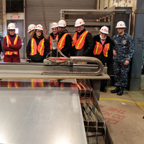FRONTLINE INNOVATION: DARPA TO PUT FAB LAB AT NAVY SHIP MAINTENANCE CENTER
High-tech fabrication facility aims to enhance ship maintenance & repair by enabling more cost-effective training and rapid onsite production of parts and components
DARPA and the Navy recently agreed to locate a fabrication laboratory, or Fab Lab, at the Mid-Atlantic Regional Maintenance Center (MARMC, pronounced “mar-mack”) in Norfolk, Virginia, under DARPA’s

Manufacturing Experimentation and Outreach Two (MENTOR2) program.
The goal of MENTOR2 is to reduce logistics supply chain costs and boost defense readiness by improving training and tools for operating, maintaining and adapting complex military equipment in low-tech environments—for example, repairing unmanned aerial vehicles in austere locations or fixing ship systems at sea. Some machine shops and fabrication capabilities exist aboard ships and in deployed areas, but these facilities provide only a fraction of the components needed for deployed operations—largely due to limited access to the adaptive manufacturing technology and comprehensive design expertise needed for in-theater fabrication. MENTOR2 aims to provide troops advanced tools and training, so they can rapidly design and fabricate needed components on the spot.
Fab Labs are design and fabrication shops outfitted with modern digital tools and equipment—such as laser cutters, routers, 3D printers, vinyl cutters for flexible circuit boards and digital design tools that use open-source software. DARPA is establishing the Navy’s customized Fab Lab through the Fab Foundation, a non-profit organization that oversees the international Fab Lab Network, a collaborative, knowledge-sharing community of more than 450 Fab Labs in 55 countries. The Fab Labs came out of the Massachusetts Institute of Technology’s Center for Bits and Atoms in 2001. The vision for a Fab Lab at MARMC is to provide ship maintainers training on state-of-the-art fabrication tools, so they can create unique components or training aids much faster and at lower cost than is possible today.
“We’re excited to team with the Navy to bring cutting-edge design and fabrication tools and training to a large regional ship maintenance facility,” said Gill Pratt, program manager in DARPA’s Defense Sciences Office. “Military maintainers are incredibly resourceful and creative in austere deployed locations and at sea far from fabrication or repair facilities. They are pros at adapting what they have to get the mission done. But beyond the need to facilitate quick repairs, we hope that by training Sailors on Fab Lab equipment they’ll be better able to convert their innovative ideas into designs and rapid prototypes that could be certified for wider fleet use. Prototype component designs potentially could be shared digitally across the Navy, and perhaps result in Fab Labs being established in other military locations.”
Navy leaders at MARMC said they foresee significant benefits from having modern training and tools on hand for ship maintenance and repair.
“Hosting the first Navy Fab Lab at MARMC is a great partnership with DARPA,” said Lt. Todd Coursey, MARMC Project Officer. “We’re working with DARPA to develop curriculum and certification to support our Warfighters—working to heighten their understanding of high-technology systems and how to use advanced digital fabrication and computation tools to maintain and adapt ship systems. One of our desired outcomes is to develop a condensed additive manufacturing workforce training curriculum that could be sourced to Fleet and other Department of Defense personnel—truly enabling a more adaptive and innovative workforce.”
The Fab Lab installation and initial operation is expected in April.
